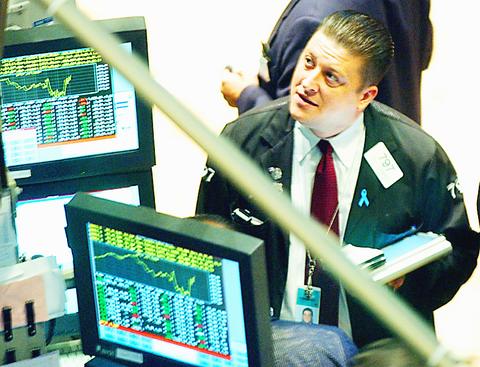These are brutal days on Wall Street and when the going gets tough, the tough get ... well, a little bit depressed actually.
With the Dow Jones Industrials Average plunging to its lowest level since October 1998 and the NASDAQ faring even worse, the high-octane world of the trading floor is suddenly running on empty.
"It's depressing, you know ... traders get very depressed," said Todd Leone, managing director of equity trading at SG Cowen Securities Corp. "It's difficult to come in every day and lose money. Everybody I talk to is tired. It's like `Oh I need a couple of days off. The markets have been beating me up.' That's how you feel."

PHOTO: AFP
Rational thought seems to have fled the US stock markets, chased away by a tidal wave of emotion -- or more specifically, outright panic -- among investors whose confidence has been shattered by a series of corporate scandals.
The psychological meltdown has left people like US Federal Reserve chairman Alan Greenspan and New York Stock Exchange chairman Richard Grasso looking like waterlogged Little Dutch Boys, struggling to plug gaping holes in the dyke of public concern.
"Please be patient. Please don't do something that emotionally feels good but, in the long term, will be a mistake," Grasso pleaded to investors on Sunday after yet another week of market bloodletting.
President George W. Bush echoed the "don't panic" message on Monday when he stressed that US economic fundamentals were strong, despite the horrendous declines that have wiped seven trillion dollars off the value of stocks since March 2000.
"I know the economics -- the platform for growth is in good shape," Bush said.
So far, such assurances have fallen on deaf ears, and the investors are continuing to sell their positions almost as fast as the traders can trade them out.
The stressful nature of the job and the high burn-out rate mean that the composition of trading floors has always had a strong bias towards young, gung-ho operators.
So for many traders in their twenties and thirties, who revelled in the astonishing bull run of the 1990s, the current crisis is an entirely new and unsettling experience.
Suddenly, jobs are on the line and the prospect of the traditional hefty annual bonus has been wrenched away for the foreseeable future by the downward spiral of the Dow Jones average.
Unexpectedly, however, the trading floor seems to exude an eerie surface calm.
The emotional temperature and decibel levels may surge from time to time, but for the most part the atmosphere is subdued with the traders hunched sombrely over their flashing screens.
"You still get some yelling, but I find when people are losing money they tend to be quieter," said Leone. "The jokes and the bravado just dry up after a while."
In such trying times, some companies are looking to relative "old-timers" to help guide their younger colleagues along.

The CIA has a message for Chinese government officials worried about their place in Chinese President Xi Jinping’s (習近平) government: Come work with us. The agency released two Mandarin-language videos on social media on Thursday inviting disgruntled officials to contact the CIA. The recruitment videos posted on YouTube and X racked up more than 5 million views combined in their first day. The outreach comes as CIA Director John Ratcliffe has vowed to boost the agency’s use of intelligence from human sources and its focus on China, which has recently targeted US officials with its own espionage operations. The videos are “aimed at

STEADFAST FRIEND: The bills encourage increased Taiwan-US engagement and address China’s distortion of UN Resolution 2758 to isolate Taiwan internationally The Presidential Office yesterday thanked the US House of Representatives for unanimously passing two Taiwan-related bills highlighting its solid support for Taiwan’s democracy and global participation, and for deepening bilateral relations. One of the bills, the Taiwan Assurance Implementation Act, requires the US Department of State to periodically review its guidelines for engagement with Taiwan, and report to the US Congress on the guidelines and plans to lift self-imposed limitations on US-Taiwan engagement. The other bill is the Taiwan International Solidarity Act, which clarifies that UN Resolution 2758 does not address the issue of the representation of Taiwan or its people in

US Indo-Pacific Commander Admiral Samuel Paparo on Friday expressed concern over the rate at which China is diversifying its military exercises, the Financial Times (FT) reported on Saturday. “The rates of change on the depth and breadth of their exercises is the one non-linear effect that I’ve seen in the last year that wakes me up at night or keeps me up at night,” Paparo was quoted by FT as saying while attending the annual Sedona Forum at the McCain Institute in Arizona. Paparo also expressed concern over the speed with which China was expanding its military. While the US

SHIFT: Taiwan’s better-than-expected first-quarter GDP and signs of weakness in the US have driven global capital back to emerging markets, the central bank head said The central bank yesterday blamed market speculation for the steep rise in the local currency, and urged exporters and financial institutions to stay calm and stop panic sell-offs to avoid hurting their own profitability. The nation’s top monetary policymaker said that it would step in, if necessary, to maintain order and stability in the foreign exchange market. The remarks came as the NT dollar yesterday closed up NT$0.919 to NT$30.145 against the US dollar in Taipei trading, after rising as high as NT$29.59 in intraday trading. The local currency has surged 5.85 percent against the greenback over the past two sessions, central